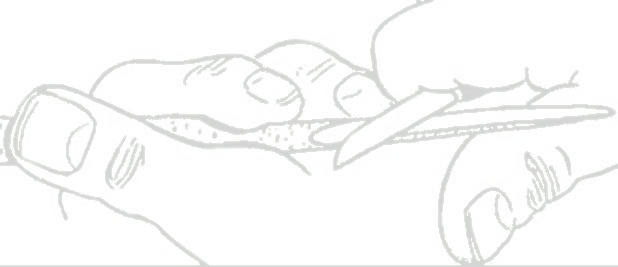The first planning is when you select a subject to whittle or carve. Since I am basically a whittler (I try to use only my pocket knife), there are some subjects that just present too much of a problem when only using a pocket knife.
Once the subject has been determined you need a pattern. I will be whittling a small whale. The project will be a piece whittled in-the-round. I draw or trace the subject onto a 1/4" thick or thinner piece of plywood, and cut it out on the scroll saw (cut right on the line).
Next place the pattern onto the piece of wood that you will whittle, being sure to place it so that the grain of the wood will be running longways to the long part of the pattern. Next, trace the pattern onto the thickness of wood to be whittled. In this case 1/2". Now use the scroll saw to make the "cut-out". Be sure to cut on the outside of the traced or draw line. Plus, I try to leave a handle on the smaller cut-outs to hold on to while whittling.
For lots of us, there is the urge to get started right away, by making cuts. Now is the time to think about what you'll be doing. Your first few cuts may set the course to your relative success with the whittled whale. When whittling a new piece, I like to just sit and whittle it in my mind before anything. I'll try sequences of cuts in my mind until I arrive at a sequence that I think will work. Following are some things to be considered when planning your sequence of whittling:
Identify the parts that will be in front or or behind other parts.
Identify parts that will be thinned out.
Identify parts that because of their thinness may be weaker.
Identify parts that will be rounded, tapered, squared, etc.
On the whale there is a top fin that must be cut back or thinned. This is so marked and can be done right off the bat. This will be my starting point.
I marked the top fin with black marker so it would show up. Not too good with a black background. I also marked the large lower fins because they will have to be left as is, with some of the body around them removed so they will
stand out".
My cutting/whittling sequence:
1. Stop cut at bottom of top fin.
2. Make slicing cut down from the top of the top fin to the stop cut, and remove the wedge of wood to thin the top fin.3. Make stop cut at top of bottom fins where they come out of the whales body. Since this arc is so tight, I like to use a series of shallow plunge cuts with the knife tip.
4. Make a stop cut at the base of the whales tail.
5. Begin to thin the area up to and from the tail. Make thin slices up and down to the stop cut at the base of the tail.
6. Begin to thin the whales tail.
7. Remove thin slices up to the base of the larger fins that you previously defined with stop cuts.
8. Begin to round off the whales nose area.
9. Continue shaping the body. This is done with a very sharp knife, taking thin long slices when you can. Pay attention to the direction of the grain, and reverse the direction of your cuts when necessary.
10. Split the two long fins, and shape.
11. Sand the whale, or not!
12. Sanded!
13. Use the knife to make the grooves on the bottom of the whale. See the first photo!


















No comments:
Post a Comment